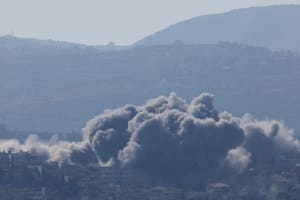Israel took off the gloves in Lebanon – but enthusiasm comes too early as all-out war hasn’t begun yet
Hezbollah is on the ropes but remains dangerous as long as it isn’t knocked out

These have been the worst two weeks in the history of Hezbollah.
The Lebanese terror organization has been reeling under an unprecedented onslaught of blows that leave it on the ropes for now – but as the saying goes, wounded animals are the most dangerous, and Israel is well advised to stay vigilant.
Over the last month, Israel has shifted most of its attention to the northern front, following the large-scale preemptive strike that foiled a planned Hezbollah assault, and the defeat of Hamas’ Rafah Brigade in Gaza around two weeks ago.
Last Monday, the Israeli government declared the restoration of security in northern Israel to be one of the official war goals – and Israeli forces apparently didn’t lose any time in getting to work.
What followed was an unbelievable series of heavy blows against Hezbollah that is worth recapitulating to understand the depths of Hezbollah’s predicament.
On Tuesday, thousands of pagers and beepers exploded in the hands of terror operatives across Lebanon. Shockingly, the next day, radio devices exploded too. Dozens of operatives were killed, and thousands suffered gruesome wounds, taking them out of commission for weeks.
Next, an Israeli airstrike in Beirut killed two of Hezbollah’s top commanders and almost the entire command staff of its elite Radwan Unit.
Steadily escalating its airstrikes, Israel continued by destroying some 100 rocket launchers, before taking off all gloves on Saturday and embarking on an awe-inspiring series of massive airstrikes over the next days.
After hitting some 400 targets, on Monday morning the IDF warned Lebanese citizens before launching multiple, uninterrupted waves of strikes over the next 24 hours, destroying around 1,600 Hezbollah targets and almost killing another senior commander. The strikes continued into Tuesday and saw another senior commander being eliminated in Beirut.
In Israel, the mood understandably bordered on enthusiasm, with media reports suggesting that Israel had already destroyed around half of Hezbollah’s total rocket arsenal.
“To the best of my checks since last night, the IDF expresses a lot of doubts regarding these percentages,” cautioned Doron Kadosh, Army Radio’s military correspondent.
“True, the achievements are significant. There is extensive damage mainly to Hezbollah’s short-term rocket capabilities…It is estimated that [the strikes] subtracted a few dozen percent from it, but it is really not certain that it’s 50%.”
Much of this feeling was created by the seemingly muted response from Hezbollah over the past few days. Despite deepening its attacks and on Tuesday even targeting Tel Aviv for the first time, the retaliation has been nowhere near what many Israelis feared.
“The fear of another 2006 war haunted Israel, and soon fear became an over-arching narrative that Hezbollah was some kind of all-powerful monster,” wrote Seth Frantzman, a security analyst for the Jerusalem Post and the Foundation for Defense of Democracies.
Hezbollah’s range expanded to regular attacks on Haifa, Nazareth and the Jezreel Valley region, but the rocket barrages were relatively small and were easily intercepted. To date, it hasn’t managed to cause significant damage or kill a single Israeli.
Whether the severe blows of the past days have deprived Hezbollah of the ability to carry out larger or more precise attacks, or whether it has chosen to keep these assets hidden for now, remains unclear at the moment.
There are some indications that the group has been hurt badly enough to hamper its rocket fire. For one, it has reportedly asked Iran for assistance – but was rebuffed.
Hezbollah has also recently started to claim in its official statements that its actions serve to “defend the Lebanese people,” not just to support the Palestinians, in an apparent attempt to shore up domestic support.
Security sources told Walla News defense analyst Amir Bohbot, “It seems that Hezbollah was surprised by the intensity of fire and the precision of the IDF strikes, which managed to reveal the extent of its outposts and launch sites that it built over 20 years. According to estimates, the Shiite terrorist organization is having difficulty building a general picture of the situation and carrying out orders due to the strength and precision of the IDF’s attacks.”
IDF Spokesman Daniel Hagari has mentioned that the Air Force repeatedly managed to thwart planned rocket barrages after launch preparations were identified by Israeli intelligence.
“The denial of advanced capabilities combined with the destruction the IDF is wreaking in Lebanon surprised its operatives.”
“However, the military arm of Hezbollah is far from disbanding and maintains a very high level of discipline,” Bohbot cautioned, and it has shown itself able to quickly recover from heavy blows in the past.
In addition, even according to the most optimistic estimates, Hezbollah still retains over half of its massive arsenal.
So far, Hezbollah hasn’t used its heavy ballistic missiles except in one launch against Tel Aviv. It also hasn’t launched massive drone swarms that could overwhelm the Iron Dome, hasn’t attempted to shoot down IDF fighter jets, or tried to sink Israeli navy ships with its advanced anti-ship missiles.
Maybe most importantly: Like Hamas, Hezbollah probably can’t be beaten from the air. The Israeli strategy at the moment seems to aim at pressuring the group into a diplomatic arrangement enabling northern Israel’s residents to return home.
The complete defeat of Hezbollah is not being discussed at all – it would likely require a massive ground invasion and the takeover of all of southern Lebanon, if not the whole country.
On the other hand, it’s important to keep in mind that the IDF also hasn’t used all the tools at its disposal and has held back from targeting Hezbollah’s headquarters in Beirut’s Dahiyeh district, for example.
“The bottom line is that we’re now in a new phase. The increasing frequency of blows that Israel delivers to Hezbollah aims to achieve the objectives of war without triggering an all-out regional conflict,” concludes Maj.-Gen. (res.) Tamir Hayman, director of the Institute for National Security Studies (INSS).
“It’s crucial to act decisively before such a war escalates. However, these strikes may further escalate the campaign against Hezbollah, increasing the risk of full-scale war before Hezbollah agrees to our ceasefire terms.”
Like in the Gaza War, the U.S. will be crucial in setting the course of the Lebanon campaign.
If it allows Israel to escalate its attacks to a level that forces Hezbollah to the negotiating table, Israel's strategy can prove to be successful.
However, if, like during the Gaza War, the U.S. begins applying public pressure on Israel instead of its enemies, Hezbollah and its backers in Iran are likely to take the cue from Hamas leader Yahya Sinwar and try to hunker down until victory.

Hanan Lischinsky has a Master’s degree in Middle East & Israel studies from Heidelberg University in Germany, where he spent part of his childhood and youth. He finished High School in Jerusalem and served in the IDF’s Intelligence Corps. Hanan and his wife live near Jerusalem, and he joined ALL ISRAEL NEWS in August 2023.
You might also like to read this:













